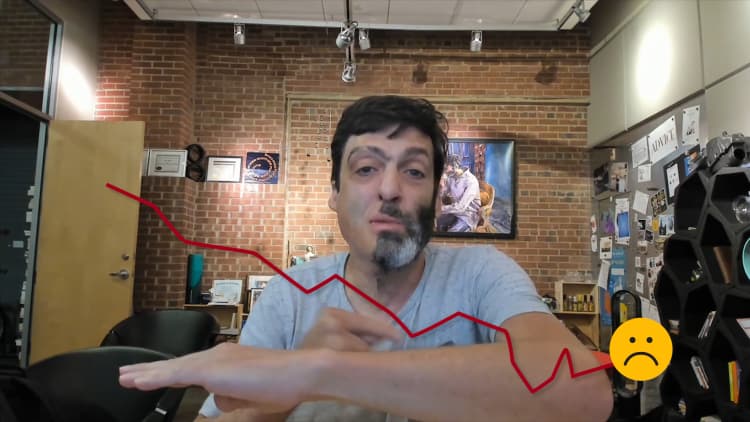Remember the brutal sell-off last year when stocks suffered their worst December since the Great Depression? Something worse than that could happen in days, a Nomura analyst said.
Macro and quant strategist Masanari Takada turned heads earlier this month with his bold call for a "Lehman-like" plunge. He's sticking with this prediction as market sentiment shows no signs of improving, leading him to believe a monster sell-off could arrive this week.
"The U.S. stock market especially is facing its greatest test of the year thus far," Takada said in a note to clients on Monday. Low sentiment is poised to prompt "panic-selling by fundamentals-oriented investors and systematic selling by trend-following technical investors along the way," he said.
Takada's view, the most pessimistic on Wall Street, is based on macro and quantitative data including flows from hedge funds and other players, which showed sentiment is approaching the lowest level of the current cycle. He had predicted the first explosion in the Cboe Volatility Index, aka Wall Street's "fear gauge," which swung to the highest in 2019 on Aug. 5 when China allowed its currency to drop to a level unseen since the financial crisis amid the trade war.
This week is also the last week before the Labor Day weekend. Volumes are typically low at the end of August, which could exaggerate market moves.
The Dow tanked more than 33% in 2008, the year in which Lehman Brothers went bust. The collapse helped catalyze the financial crisis and bring on the Great Recession. By March 2009, the benchmark hit its lowest level of 6,443.27, a peak-to-trough decline of about 55%.

'Uncanny resemblance'
Takada pointed out market performance over the past two weeks showed an "uncanny resemblance" between now and 2008. Technical investors including Commodity Trading Advisors are already trimming their long positions "at an accelerating pace," which could exacerbate selling going forward, Takada said. CTAs are trend-following quants that trade futures contracts and commodity options.
"The correlation between sentiment then and now remains quite high," Takata said. "Even the passing risk-on phase after the initial shock of the yield curve inversion ... and the risk-off mood that struck on 23 August neatly track the pattern recorded in 2008."
"If this uncanny resemblance between the two patterns continues to hold, sentiment could soon fall to a level not seen since December 2018," he added.
The Dow Jones Industrial Average suffered its worst day of the year Aug. 14 when the yield on the benchmark 10-year Treasury note broke below the 2-year rate, an odd bond market phenomenon that historically has preceded recessions. The curve has since repeatedly inverted as the longer-term yields continued to fall on trade war fears.
Stocks also took a big hit on Friday after China struck back by slapping retaliatory tariffs on U.S. goods. August has been a volatile month for stocks with the S&P 500 losing 3.5% so far.


